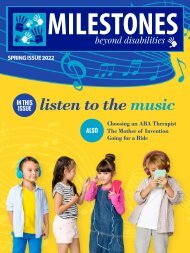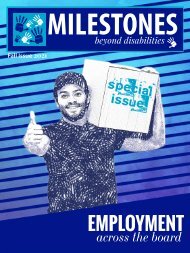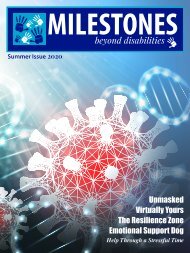Spring Issue 2021
Helping Individuals with Disabilities & their Families Achieve & Celebrate Events & Milestones in their Lives
Helping Individuals with Disabilities & their Families Achieve & Celebrate Events & Milestones in their Lives
Create successful ePaper yourself
Turn your PDF publications into a flip-book with our unique Google optimized e-Paper software.
eyond disabilities<br />
<strong>Spring</strong> <strong>Issue</strong> <strong>2021</strong><br />
Let’s Get Cooking<br />
Planning to Succeed<br />
School and Home<br />
I Need a Lawyer?
contents<br />
spring <strong>2021</strong><br />
03 Planning to Succeed<br />
07 Let’s Get Cooking<br />
09 I Need a Lawyer?<br />
13 School and Home<br />
16 Play for Life<br />
19 Exceptional Sports<br />
21 Carving out a Job<br />
23 Happy Trails<br />
Publisher<br />
Susie Redfern, is the parent of a special<br />
needs child who recently “aged out”<br />
of the public-school system.<br />
She developed Milestones Magazine<br />
to help individuals with disabilities<br />
and their families achieve and celebrate<br />
events and milestones in their lives.<br />
info@milestonesmagazine.com<br />
1<br />
MilestonesMagazine.net
PLANNING TO SUCCEED<br />
Back in my college days I was taking a required<br />
Biology class. One day, the professor was<br />
giving a lecture on the process of photosynthesis,<br />
which is how plants get energy from light<br />
(or something like that). The process of<br />
photosynthesis has several steps, which the<br />
So, WHAT is<br />
Executive Functioning?<br />
You may hear this term often and we hope<br />
the following clarifies your understanding.<br />
professor was going through. Unfortunately,<br />
he wasn’t very organized. He would go through<br />
Executive function skills are critical for all of us;<br />
the steps out of order, which was exceedingly<br />
frustrating to this then-college student trying<br />
they are a group of skills that we use every day to<br />
to take notes about the whole darn thing.<br />
learn, manage and accomplish things and<br />
This anecdote demonstrates the importance of<br />
executive functioning (and no, I’m not referring<br />
generally get what we want out of life.<br />
to executive as a noun, in the company CEO<br />
sense). I am pleased to introduce Caryl<br />
Frankenberger, Ed.M., Executive Director of<br />
Frankenberger Associates, who has written the<br />
Executive functioning (EF) skills include<br />
but are not limited to:<br />
article below on this very topic.<br />
3
Planning and Prioritizing<br />
In order to complete a task, you begin with<br />
the larger goal in mind. Once the goal is<br />
solidified, you lay a plan of action, prioritizing<br />
mental math requires one to make calculations<br />
in mind. Working memory is a very important<br />
EF skill and one that is often a weakness in our<br />
learning disabled and ADHD populations.<br />
what is most important. Students have to plan<br />
and prioritize many aspects of their lives,<br />
especially their short- and long-term<br />
school assignments.<br />
Self-Monitoring<br />
Completing a task or an assignment, socializing<br />
and just about everything we do requires<br />
one to monitor their performance. We have<br />
Organization<br />
Once you have a plan you have to organize<br />
to think about what we are doing, how we are<br />
the parts into the whole. This requires sorting<br />
through and arranging information into a<br />
system that works for you. Our children have<br />
multiple organizational demands made on<br />
them every day, from rising in the morning,<br />
organizing and locating their belongings,<br />
getting out the door, navigating multiple<br />
classes, returning home to homework and<br />
then heading to bed, and much more.<br />
Flexible Thinking<br />
When working through a task one needs to<br />
think flexibly. If you are rigid in your thinking,<br />
then it is unlikely that you will apply different<br />
approaches when problem solving. Often,<br />
one has to revise a plan of action or obtain new<br />
information, especially if a mistake has been<br />
accomplishing the task and, in the end, asking<br />
ourselves how did I do? This requires one<br />
to monitor their performance and actions by<br />
stopping and reflecting, an important skill that<br />
takes time and practice to acquire.<br />
SKILLS for LIFE<br />
made. We all need to think flexibly and be<br />
ready to change our course of action.<br />
Attention<br />
Attention plays a role in everything we do. To<br />
accomplish a goal, you must focus on the task<br />
at hand. Once you are focused you have to<br />
sustain attention and recognize when your<br />
attention shifts. If it has waxed and waned,<br />
you must bring your focus back to the activity<br />
and maintain focus until the task is completed.<br />
Many students have attentional weaknesses<br />
that hamper their ability to complete tasks.<br />
Working Memory<br />
Working memory is the ability to hold and<br />
manipulate information in mind. When you<br />
read you have to hold and comprehend<br />
information from the beginning to the end<br />
of the page or chapter; listening to directions<br />
requires the same skill, holding and remembering<br />
several pieces of information. Taking notes<br />
in class demands listening, comprehension<br />
and writing simultaneously, and performing<br />
4
Impulse Control<br />
The old adage, “think before you act” applies to the EF skill<br />
impulse control. It really means to control your impulses, to<br />
resist saying or doing something, to stop one’s self. In addition<br />
to controlling our impulses, we have to consider how our<br />
behavior impacts others. This is an important skill for all<br />
students to master.<br />
Emotional Control<br />
Much like attentional and impulse control, emotional control<br />
is the ability to manage your thoughts and emotions so that<br />
you can achieve your goals. Emotions take many forms and,<br />
for example, in the classroom a student has to control their<br />
frustration, annoyance at others, anger at something that did<br />
not go their way. Understanding and managing emotions is<br />
critical to the successful completion of tasks, especially<br />
group work and social relations.<br />
Goal Directed Persistence<br />
Persistence is essential for completing tasks. Many students<br />
struggle to complete tasks because of distractions or because<br />
inevitable setbacks become insurmountable roadblocks. It is<br />
important to maintain a focus on the task at hand and to be<br />
able to summon the grit necessary to push through inevitable<br />
“<br />
Executive<br />
Functioning<br />
is a broad set of<br />
self-directed<br />
SKILLS<br />
that IMPACT<br />
all aspects<br />
of our lives.<br />
challenges with the overall goal in mind.<br />
It is important to<br />
Executive functioning is a broad set of self-directed skills<br />
that impact all aspects of our lives.<br />
Executive function challenges are often seen at home, in the<br />
classroom and at work. Executive functioning difficulties can<br />
arise from weaknesses in any of the aforementioned skills,<br />
which impact goal directed behavior. It is important to<br />
understanding and address these deficits early so that they<br />
do not become roadblocks to success.<br />
Caryl Frankenberger, Ed.M.<br />
Frankenberger Associates, Branford CT<br />
understanding and address<br />
these deficits early so<br />
that they do not become<br />
roadblocks to success.<br />
“<br />
www.frankenbergerassociates.com<br />
M<br />
5
6
Let’s Get<br />
Cooking<br />
Many kids love to mess around in<br />
the kitchen. For some of them, the<br />
messing around may actually<br />
involve helping to prepare meals<br />
with their mom or dad.<br />
Some of those budding chefs may be<br />
children with sensory or cognitive<br />
challenges that complicate the steps<br />
involved in preparing a recipe or a<br />
meal. That’s where people such as<br />
Terri Jordan come in. She came up<br />
with a system to benefit her own<br />
son, which is where a number of<br />
parents start who create products,<br />
services, or businesses that help<br />
empower and support people<br />
with disabilities.<br />
I am pleased to introduce<br />
Terri Jordan and her creation,<br />
The Color-Coded Chef.<br />
7
The Idea Behind the Kit<br />
Like all parents, I wanted my son to acquire basic life skills. So,<br />
at age 16, we decided to try cooking. I quickly realized he did not<br />
understand things like “1/4 cup” or “2 tablespoons” — the<br />
measurements kept him from being able to follow traditional<br />
recipes. But he did understand color. This was The Aha Moment<br />
when the idea behind The Color-Coded Chef was born!<br />
Therapy Opportunities<br />
The more you practice, the better you<br />
become at: Gross and Fine Motor Skills,<br />
Speech, Socialization, Teamwork and<br />
Behavior. Plus, when you make your own<br />
food, you tend to try more types of food.<br />
You open yourself up to new possibilities<br />
After many hours of trial and effort, the idea of this cooking kit<br />
became a hands-on reality. And its ultimate goal? To spend<br />
and you elevate your quality of life!<br />
quality time together while teaching life skills<br />
that build self-esteem and independence.<br />
WOW!! What a wonderful way to foster<br />
pride and self-worth in a loved one as they<br />
accomplish an everyday task!<br />
How Does It Work?<br />
The Color-Coded Chef Kit is a collection of<br />
recipes with detailed step-by-step instructions<br />
and simple illustrations that make the recipe<br />
easy to follow and understand. The Ingredients<br />
page can be used as a grocery list at the store,<br />
then used as a checklist when you begin to<br />
cook. The kit comes with a dry-erase marker so<br />
you can easily check off lists on the laminated<br />
cards. Wipe off and reuse! In addition to these<br />
user-friendly recipes and instructions, the kit includes color-coded<br />
measuring cups and spoons and a collection of safe, easy-to-use<br />
common kitchen utensils.<br />
What is Happening Now?<br />
Over the last several years, we have come<br />
so far — as a family and as a company.<br />
And today, I am proud to say my son<br />
Visit TheColorCodedChef.com for a sample Chocolate Chip<br />
Cookie recipe!<br />
assembles The Color-Coded Chef kits<br />
for shipment!<br />
The Benefits of This Kit<br />
The wonderful thing about The Color-Coded Chef Kit is that there<br />
are so many more benefits beyond just learning the practical life<br />
skill of cooking. With each recipe, you are incorporating: Decision<br />
Making, Teamwork, Social Skills, Sequencing, Directions,<br />
Terri Jordan can be reached by:<br />
636-422-1515<br />
Facebook.com/thecolorcodedchef<br />
TheColorCodedChef.com<br />
M<br />
Health and Hygiene Self-Discipline, Safety, and Patience.<br />
8
I Need a<br />
Lawyer?<br />
Many parents with children receiving special education services,<br />
have issues with the school system for one reason or another.<br />
Perhaps their child is in what they regard as an inappropriate<br />
setting (placement concern). Maybe the child isn’t making<br />
expected progress in one or more subject areas. There are many<br />
possible areas of concern.<br />
For some (perhaps even most) instances of conflict, parents are<br />
able to work through the problems directly with the school;<br />
whether on their own or with the help of an IEP (Individualized<br />
Education Plan) Advocate. The IEP Advocate is typically there to<br />
provide support/guidance and mediation, if necessary, for the<br />
parents, but is not a legal representative.<br />
There are situations where, despite the efforts of everyone<br />
involved, an impasse comes about and parents are left wondering<br />
whether legal representation is their only option. I am pleased to<br />
invite Christine Lai, Executive Director of the Special Education<br />
Legal Fund, to address this question. Christine Lai wrote<br />
A Parents Guide to Connecticut Special Education Attorneys,<br />
and much of the information in the guide is helpful for parents<br />
regardless of where they live in the United States.<br />
9
“Many parents struggle through the special education process<br />
with their child’s school district. For some, retaining a special<br />
education attorney is the only way to overcome the obstacle or<br />
hurdles in their child’s way to receiving a free and appropriate<br />
public education. But what is a special education attorney, and<br />
how can I as a parent find the right one for me?<br />
A special education attorney is an attorney who practices law<br />
on behalf of children and young adults to help secure necessary<br />
educational services as required under the law (generally the<br />
A special<br />
education<br />
attorney<br />
is an attorney<br />
who practices law on<br />
behalf of children<br />
and young adults<br />
Individuals with Disabilities Education Act or IDEA). Special<br />
education attorneys can practice on behalf of parents and<br />
families as part of the private bar association or as part of an<br />
agency like Legal Aid, or on behalf of schools, school districts<br />
and boards of education. A special education attorney generally<br />
has undergone training that includes college, a law degree, and<br />
some type of either coursework or practical experience that<br />
addresses the specific needs of special education students. The<br />
last piece, coursework or practical experience, is particularly<br />
important to consider when a parent is embarking on the process<br />
of seeking out and hiring an attorney to represent their child in<br />
a special education matter. Special education is a particular<br />
specialty of the law and IDEA is a very specific and voluminous<br />
piece of legislation with complex timelines and requirements.<br />
Hiring an attorney who practices, for example, family law, will<br />
to help<br />
not get you where you need to be in terms of representation by<br />
a lawyer who understands the myriad and complex issues of<br />
secure necessary<br />
educational<br />
services<br />
as required<br />
under the law.<br />
special education. For the same reason that you wouldn’t hire<br />
an attorney who practices patent law to defend you in a criminal<br />
trial, you shouldn’t hire an attorney with any other specialty than<br />
special education or disability rights law to represent your child<br />
and family in a special education matter.<br />
The other reason to hire a special education attorney to<br />
represent your child’s specific issues in the special education<br />
realm is because special education law in most states is a<br />
relatively small and tight knit community. In Connecticut, the<br />
private special education bar is well known to one another; most<br />
of the attorneys know each other well and have often worked side<br />
by side for many years advancing the rights of students in special<br />
education. In addition, the parent-representing attorneys are<br />
familiar with the school districts – with the administrators,<br />
special education coordinators, in house attorneys, and outside<br />
counsel that represent schools, school districts, and boards of<br />
education in special education matters. When you as a parent<br />
hire an attorney to represent your child’s special education case,<br />
the school district will also have legal resources to draw upon.<br />
10
In the complex process that follows, having an attorney that knows<br />
the players is an invaluable asset for a family. In addition, a good<br />
special education attorney also knows the other players that matter<br />
in the special education community, and will know what clinicians<br />
write the best reports and who performs best on the stand in a due<br />
process hearing should it come to that.<br />
So how do I find the right special education attorney for my<br />
family? First and foremost, interview more than one attorney to<br />
figure out who you feel most comfortable with. Since you are<br />
going to be spending an inordinate amount of very stressful time<br />
with this person, make sure you communicate well and have a good<br />
level of trust with your legal professional. Word of mouth<br />
recommendations are important, but remember that each<br />
student is different, and each student’s case is different. Just<br />
At the end of the day,<br />
whatever attorney<br />
you decide to hire,<br />
make sure that<br />
1. they have specific<br />
because your neighbor’s attorney was successful with your district<br />
school doesn’t necessarily mean that the same will be true for you<br />
and your child. Ask around – the local bar association will likely<br />
have a list of special education attorneys, and private schools you<br />
are interested in or professionals who have worked with your child<br />
may also have recommendations of attorneys. A great resource<br />
for special education attorneys is the directory of the Council<br />
of Parent Attorneys and Advocates, or COPAA. COPAA is a<br />
national nonprofit organization dedicated to advancing the rights<br />
of students and their families in matters of special education and<br />
disability rights; they maintain a directory of member attorneys<br />
which can be useful for families beginning the special education<br />
experience in special<br />
education law<br />
2. they have experience<br />
representing students with<br />
your child’s learning profile<br />
as well as the outcome you<br />
are attempting to achieve<br />
legal process. (www.copaa.org).<br />
for your student<br />
3. they have experience with<br />
your school district<br />
4. you understand how they<br />
are charging you for their<br />
services.<br />
Special education attorneys come to this field of law for many<br />
reasons, but in my experience, many of those reasons are personal.<br />
So many of the attorneys that I’ve met in Connecticut who<br />
represent parents in special education matters do so because they<br />
have personal experience as a parent of a child with an IEP. Their<br />
experience advocating for their own child in the special education<br />
system in many cases has acted as inspiration for their professional<br />
legal careers. Other special education attorneys have backgrounds<br />
as special education teachers, administrators, school psychologists,<br />
social workers. An increasing number of special education<br />
attorneys are entering this field of law because of experience they<br />
have had in the special education system themselves. As selfadvocates<br />
and special education attorneys, their experiences both<br />
inside the system and advocating for students within the system<br />
can be particularly compelling.<br />
11
Many a family has seen an attorney-client relationship run<br />
aground over a misunderstanding or lack of clarity around<br />
legal fees. While all attorneys are different and fee arrangements<br />
vary widely among attorneys and across regions and states, you<br />
should always have a clear understanding of how your attorney<br />
is charging you for his or her services. In Connecticut, attorneys<br />
can charge on a hourly basis or according to a flat fee retainer,<br />
and the way in which an attorney bills may be a factor in the<br />
attorney you select to represent your family. You should ask your<br />
prospective attorney clear questions about the billing process –<br />
now is not the time to be shy about money! Having everything<br />
up front from the beginning will go a long way to eliminating any<br />
future miscommunications or misunderstandings about fees or<br />
fee structures. Finally, you should always ask your attorney for<br />
an estimate of what he or she believes your case will take in terms<br />
of time, and therefore money. While some things are not controllable<br />
(the response of the school district in the process is the<br />
biggest unknown), all attorneys should be able<br />
to give you a ballpark estimate of what your case<br />
will cost you in terms of hours and dollars, with<br />
certain caveats in mind.<br />
Finally, very often parents reach out to a special<br />
education attorney because they’ve reached an<br />
impasse or an obstacle in their child’s<br />
educational journey, and they cannot move<br />
forward without support. But what can you do<br />
if you can’t afford the thousands of dollars in<br />
retainer fees that most attorneys charge to let<br />
you walk in the door? Special Education Legal<br />
Fund was founded on this premise: that all<br />
families deserve equal access to full advocacy<br />
efforts for their children. By providing over<br />
$350,000 in grants since 2018 to families in<br />
35+ Connecticut & Westchester County,<br />
New York school districts, S.E.L.F. has<br />
endeavored to level the playing field for all families in special<br />
education regardless of income or background. For more<br />
information about S.E.L.F. or to inquire about S.E.L.F. grants,<br />
please visit spedlegalfund.org.”<br />
M<br />
DISCLAIMER: This article contains material previously published online at<br />
spedlegalfund.org. The guide(s) referred to in this article was written by a parent<br />
for parents. This article is intended as a resource for families who are navigating the<br />
special education system in Connecticut or Westchester, New York and is meant to<br />
provide a basic understanding of special education attorneys in those regions from a<br />
parent’s perspective, with an emphasis on attorneys who practice on behalf of<br />
children and families. This article is not intended to provide legal support, advice,<br />
or assistance, nor is it intended to replace the advice of a qualified special education<br />
attorney. Families in need of legal advice, support, and assistance should contact a<br />
special education attorney licensed to practice in Connecticut, New York, or their<br />
specific state to discuss the specific needs of their individual student.<br />
12
ScHooL and HomE<br />
The pandemic has upended virtually<br />
every aspect of life; including work,<br />
recreation, and school. For many of<br />
us, everything (or at least most things)<br />
home-school their children and follow<br />
the guidelines from the state related to<br />
home-schools (which are considered<br />
private schools).<br />
are now done at, or from, home. And<br />
for our children, that includes school,<br />
so many parents are, for the timebeing,<br />
in effect, home-schooling.<br />
Home-schooling families are not just<br />
left on their own (unless they want<br />
to be, of course). There are people,<br />
organizations and resources that can<br />
However, parents whose children<br />
are enrolled in their district’s public<br />
schools and are doing remote<br />
learning because that’s the only<br />
option their district currently<br />
offers are not home-schooling per se.<br />
Home-schooling families are those<br />
who have made a voluntary choice to<br />
help them set up and operate their<br />
home-school and join with other<br />
home-schooling families. One such<br />
person is Fiona Sifontes, Owner/CEO<br />
of NYAdvocates4Kids. In addition to<br />
her Educational Advocacy work, she<br />
has been involved in home-schooling<br />
for her own child.<br />
13
HomEScHooLiNg<br />
One may think of homeschooling,<br />
where students remain at home and<br />
learn online and/ or parents provide<br />
the curriculum. Yes, that may be true<br />
in some households but not all.<br />
Homeschooling has come such a<br />
long way, with diversity, homeschool<br />
co-op’s, social gatherings, class trips,<br />
classes at museums, galleries, and<br />
even private art/ music studios,<br />
family programs, concerts,<br />
architecture, and parks and playgrounds.<br />
Homeschooling is legal<br />
in the United States, and each state<br />
sets its policies and procedures for<br />
homeschooling. Some states have<br />
no requirements, while others want<br />
parents to submit certain forms and<br />
follow specific procedures. Please<br />
check with your state before initiating<br />
Homeschooling to prevent any legal<br />
actions against you, the parent. Your<br />
student can get the attention they<br />
need with co-op classes with low<br />
student-to-instructor ratios. Plus,<br />
meet friends who may be your<br />
friends for years or even family.<br />
There are tons of activities for<br />
students in New York who opt to<br />
homeschool. Due to this unprecedented<br />
time we are all facing, Homeschooling<br />
has become an integral<br />
part of learning. But to call virtual<br />
learning homeschooling is a stretch.<br />
I’ve homeschooled my son way<br />
before this pandemic and continued<br />
through high school. Without joining<br />
a homeschool co-op, I would’ve been<br />
lost and my son wouldn’t have the<br />
friends he has throughout the years of<br />
his homeschool learning experience.<br />
Yes, this experience can be daunting<br />
in deciding whether to homeschool<br />
or not, and dealing with the administrative<br />
and bureaucratic requirements<br />
of the New York Department of<br />
Education (NYDOE) may be<br />
overwhelming, but not giving it a<br />
chance, one can’t speak on what<br />
Homeschooling endures.<br />
14
There’s an abundance of programs for<br />
homeschoolers in New York, and let’s not<br />
forget Homeschoolers can get IDs as well<br />
from organizations like Homeschool Buyers<br />
Co-op, Zazzle, or HSLDA, to name a few.<br />
If you want your student to receive a State<br />
ID and who lives in NYC, one can get an<br />
NYC ID at the youngest age of 10. NYC<br />
ID gives you offers from free to discounted<br />
events, such as museums and cultural<br />
institutions, theaters, libraries, and<br />
educational programs, etc.<br />
Below are Homeschool Resources in<br />
New York:<br />
NYC DOE for Homeschoolers:<br />
333 Seventh Ave, Floor 7, New York, NY<br />
10001, 917-339-1793<br />
Fearless Homeschooling:<br />
339 West 47th St, Third Floor,<br />
New York, NY 10036, 917-816-1070<br />
Different Directions:<br />
339 West 47th St, Third Floor,<br />
New York, NY 10036, 917-816-1070<br />
The ROC Network for Learning:<br />
2nd Ave & East 2nd St, New York,<br />
NY 10003, 646-854-4762<br />
M<br />
Publishers Note: This article is one of a series of articles<br />
Milestones Magazine is working on about Home-Schooling.<br />
The article included in the previous edition of Milestones<br />
Magazine focused on home-schooling resources in Illinois.<br />
Planning<br />
Licensed to practice in<br />
California and Colorado<br />
for a Child with<br />
Special Needs?<br />
Learn about the<br />
Special Needs Trust<br />
for Free<br />
Email for your free<br />
Family Asset Protection<br />
Survival Guide or call for<br />
your free consultation<br />
with Diedre Braverman,<br />
Special Needs<br />
Planning Attorney.<br />
melanie@braverman-law.com<br />
303-800-1588
PLAY<br />
LIFE<br />
for<br />
One old saying, drilled into the minds of many teachers and<br />
parents, is that “children learn through play”. And despite the<br />
prevalence of computers, smartphones, and other “devices”,<br />
children still need to play: at home, at school, and at day care.<br />
However, for children who have physical, sensory, cognitive,<br />
or motor difficulties, playing itself provides significant, if not<br />
insurmountable challenges. A child may not know how to play<br />
with other children. He or she may have physical difficulties<br />
preventing him or her from reaching or accessing toys or<br />
play equipment.<br />
There are well-known types of therapy (occupational and<br />
physical, for example) that address some of these issues for<br />
children. Less well-known, perhaps, are therapies such as play.<br />
And one type I wasn’t aware of is called Recreational Therapy.<br />
I am pleased to introduce Jeanne Hastings, who is in private<br />
practice as a Recreational Therapist, and has developed a free<br />
tool on her website to help people find certified and licensed<br />
recreational therapists. Jeanne will let us know what recreational<br />
therapy is, and how it can develop and enhance play and social<br />
skills in children with and without disabilities.<br />
16
“Recreational Therapy is probably the best kept secret in<br />
healthcare. In fact, most likely the first time someone would<br />
have contact with a Recreational Therapist would be in an<br />
institutional rehabilitative setting. I first heard about<br />
Recreational Therapy and Therapeutic Recreation when I was<br />
PLAY<br />
for<br />
a junior in High School. That was 1975. I always knew at the<br />
time that I wanted to work with people with disabilities and<br />
disorders, but I was not sure what profession would best<br />
fit my own personal talents and interests.<br />
That is when I heard that our local Community College had a<br />
curriculum called Therapeutic Recreation. After two years at the<br />
community college, I was hooked. I discovered a profession that<br />
was centered on improving the quality of life of people through<br />
play. Upon graduation I continued my studies in Therapeutic<br />
Recreation at SUNY Brockport graduating in 1981 as a<br />
Certified Therapeutic Recreation Specialist, CTRS. Later I<br />
earned my Master of Science degree in Therapeutic Recreation<br />
from the University of Tennessee and have enjoyed a career as<br />
a Recreational Therapist for 40 years.<br />
LIFE<br />
Recreation, play, and leisure have always been taken for granted.<br />
It’s a given that anyone can enjoy play and participate in sports<br />
and recreation. The mind set has always been if you want to try<br />
new things all you need do is go and do it. You want to ride a<br />
bike? Go do it. You want to ski or go out to a social event; you<br />
just go and do it. If we told our parents that we were bored we<br />
were told to “go out and play” Now let’s say you are involved in<br />
a tragic accident or you are crippled with social anxieties, mental<br />
illness, or physical barriers. Going out to “play” takes on a whole<br />
new challenge. That’s where a recreational therapist can help.<br />
All throughout my career the one question that I have been<br />
asked most frequently is, “What is a Recreational Therapist?”<br />
This question was usually followed by do you play “BINGO<br />
and go out on trips”? The answer is, yes. We play BINGO<br />
and go out on trips but there is so much more to it than that.<br />
The clinical answer to that question is best stated by the<br />
American Therapeutic Recreation Association, ATRA,<br />
(ATRA-online.com).<br />
ATRA states, “Recreation Therapy, also known as therapeutic<br />
recreation, is a systematic process that utilizes recreation and<br />
other activity-based interventions to address the assessed needs<br />
of individuals with illnesses and /or disabling conditions, as<br />
a means to psychological and physical health, recovery and<br />
wellbeing. Recreational Therapy means a treatment service<br />
designed to restore, remediate, and rehabilitate a person’s<br />
level of functioning and independence in life activities, to<br />
17
promote health and wellness, as well as reduce or eliminate the<br />
activity limitations and restrictions to participation in life<br />
situations caused by an illness or disabling condition.”<br />
(ATRA May 2015).<br />
We, as professionals, work in rehabilitation as well as<br />
habilitative services. Habilitative by helping people keep, learn,<br />
or improve skills and functioning for daily living and also<br />
rehabilitative services that help a person keep, get back, or<br />
improve skills and functioning for daily living that have been<br />
lost or impaired because of being sick, hurt or disabled. We<br />
work basically the same as any rehabilitative service such as<br />
physical therapy, or occupational therapy but the biggest<br />
difference is our interventions.<br />
We utilize the clients recreational and leisure interests to bring<br />
about the desired positive changes. We are one of the first<br />
professions to provide person centered care with the goal<br />
PLAY<br />
for<br />
always to improve the quality of life of the individual. One way<br />
to improve the quality of life is through play, recreation, and fun.<br />
Although we all work to improve the physical well-being of the<br />
individual, recreational therapy also focuses on the emotional,<br />
mental, and social health of that person.<br />
Throughout my 40-year career as a recreational therapist I have<br />
had the opportunity to work with so many wonderful, gifted<br />
people in all types of treatment settings. The one treatment<br />
LIFE<br />
setting that I found to be lacking access to recreational<br />
therapy was in home health. Not only were our services<br />
unavailable but there was no easy way to find a Recreational<br />
Therapist in the community.<br />
That is why I created My Recreation Therapist LLC. My<br />
Recreation Therapist (myrecreationtherapist.com) is a FREE<br />
tool that anyone can use to find and hire their own Licensed or<br />
Certified Recreational Therapist. All a person needs do is sign<br />
up, create a profile, and describe the “job” you would like to fill.<br />
Once joined the person will have access to thousands of CTRS<br />
and LRT’s all-over North America. With a Recreational<br />
Therapist joining your treatment team you will have the most<br />
qualified professional to address quality of life issues through<br />
play, recreation, and leisure to help reach the individuals highest<br />
level of life satisfaction while improving their physical, mental,<br />
emotional and social health. Play is medicine.<br />
If you would like more information about this life changing<br />
profession, please feel free to visit our site at<br />
www.myrecreationtherapist.com.”<br />
M<br />
18
EXCEPTIONAL SPORTS<br />
When parents are looking for a<br />
recreational/sports program for their<br />
child, they don’t always find the right<br />
fit. This can be true for typically developing<br />
children, but perhaps even more so<br />
for children with challenges. Park<br />
districts typically offer accommodations,<br />
and special recreation associations<br />
and/or Special Olympics may fit the bill<br />
for some families, but other families go<br />
their own way.<br />
weeks. The program has served 50-80<br />
athletes weekly. Its initiatives include<br />
a bowling program that has met 3<br />
Saturdays monthly at a local alley<br />
called Bowlero. The program charges<br />
a nominal fee to bowlers and is<br />
otherwise supported with (generally)<br />
tax deductible donations. The program<br />
was named the Murrieta Chamber of<br />
Commerce Non-Profit of the Year for<br />
2019. The mission of the program is<br />
social interaction through recreation (in<br />
One such family founded Exceptional<br />
other words, fun and conversation).<br />
Sports, based in the southern California<br />
wine country town of Murrietta.<br />
This program, like just about everything<br />
we have taken for granted, was<br />
Exceptional Sports started about 10<br />
years ago, to fill a gap created when<br />
Special Olympics cut its program<br />
suspended due to COVID-19. The<br />
organizers hope to start up again<br />
soon. For more information visit their<br />
locally down from year-round to 10<br />
Facebook page.<br />
M<br />
The founder of Exceptional Sports is Jeffrey Nickerson,<br />
19<br />
a “special needs” parent and lawyer specialized in estate planning and special<br />
needs trusts. He and his wife run the Exceptional Sports program together.
Carving<br />
out a<br />
JOB<br />
Finding/keeping a job, especially the first job, can<br />
be a struggle for anyone. That old “Catch-22”, “you<br />
can’t get experience without a job; you can’t get a<br />
job without experience” can be an obstacle for<br />
anyone. This can be especially true for people with<br />
challenges; my younger son being a case in point.<br />
He has autism and some cognitive impairment. His<br />
only real work experience is as “team member” at a<br />
greenhouse whose mission is to provide job training<br />
for people with disabilities.<br />
We Grow Dreams remains my son’s only job experience to date.<br />
He has been declared “not work-ready” by the Division of Rehab<br />
Services (twice, in fact). It’s a real struggle. His story is not unique;<br />
it’s shared by many thousands locally, regionally, and nationally.<br />
disabilities, and increased workforce<br />
On that note, I am pleased to introduce Garret Rosiek, HR<br />
engagement at Bazaar Inc.<br />
Generalist at Bazaar Inc. This company sponsors an initiative to<br />
increase the percentage of people with disabilities in the workforce.<br />
I’ll turn it over to him to write all about it.<br />
How have we been able to succeed<br />
with this disability and inclusion<br />
initiative during the COVID-19<br />
Disability Inclusion at The Bazaar Inc<br />
At The Bazaar, Inc., our long-term goals involve hiring 50% of the<br />
workforce with people with disabilities.<br />
Pandemic? There were many<br />
variables, but the main components<br />
contributing to this change initiative<br />
include top-down support, job<br />
What is the motivation behind this? Besides giving individuals of<br />
diverse backgrounds an opportunity to step into a career and work<br />
carving roles, and altering the<br />
human resources department.<br />
environment, the data collected from our current workforce has<br />
shown positive long-term benefits of having a more significant<br />
percentage of the workforce people with disabilities.<br />
Top-Down Support: This diversity and<br />
inclusion initiative started with our<br />
CEO Bradley Nardick. At The Bazaar,<br />
At The Bazaar Inc, we have 22% of our workforce with disabilities,<br />
which translates to 28 individuals in the company. This includes<br />
individuals with disabilities, veterans, second-chance employees,<br />
and people who have experienced homelessness. The employee<br />
turnover is only 32% for individuals with diverse backgrounds<br />
than 76% turnover for individuals without disabilities.<br />
Inc. we are fortunate to have the<br />
company’s CEO be as passionate<br />
about diversity and inclusion as<br />
Bradley Nardick is. The company<br />
has been able to allocate resources,<br />
energy, and money to grow our<br />
diversity and inclusion initiative.<br />
There have been notable improvements among our employees since<br />
implementing the following strategies company-wide. Changes<br />
internally have created increased communication and collaboration<br />
There have also been significant<br />
changes in the company’s strategic<br />
planning over the past five years.<br />
with managers and staff, higher success rates for those with<br />
21
The changes include investing in disability inclusion consultants,<br />
building community support partners, and altering many different<br />
standard operating procedures to create a universal design with the<br />
workplace that better supports people from all different types of<br />
diverse backgrounds.<br />
Job Carving Roles: The purpose of job carving is to take one job<br />
and simplify it into multiple roles. The various functions are then<br />
further analyzed, and task fluency is developed from one task to the<br />
next. This creates more job opportunities with particular positions,<br />
which can be very beneficial for an individual with a disability or<br />
someone entering a new workplace environment. At The Bazaar,<br />
Inc. we perform job carving by assessing our daily operations and<br />
identifying areas that need improvement. After we find areas that<br />
needed improvement, we can job carve out multiple roles for<br />
Helping people<br />
with disabilities<br />
veterans<br />
second chance<br />
employees<br />
and people who have<br />
experienced<br />
homelessness<br />
certain positions. This process has helped our company create more<br />
roles for people with disabilities across a broader spectrum<br />
and give more opportunities for success within<br />
our organization.<br />
Alternating Human Resources:<br />
The Bazaar, Inc. altered their human<br />
resources department and brought in an<br />
employee with previous experience in<br />
applied behavior analysis and had<br />
worked with individuals with<br />
disabilities across a wide spectrum.<br />
This employee, Garret Rosiek, also<br />
has education in organizational and<br />
industrial psychology and has used<br />
his areas of expertise to create performance<br />
reviews, company-wide<br />
training and development,<br />
specialized onboarding, and has<br />
been able to train other staff how to<br />
work with individuals with various<br />
disabilities. Due to the changes made<br />
in the HR department, those working at<br />
this organization are now better supported<br />
within the organization and there have been<br />
notable improvements with collaboration among<br />
employees from all backgrounds.<br />
communication and collaboration<br />
The Bazaar Inc is dedicated and determined to have at least<br />
50% of the workforce include people from diverse backgrounds.<br />
This includes people with disabilities, veterans, second chance<br />
employees, and people who have experienced homelessness. We<br />
believe everyone should have an opportunity to work if they<br />
desire that opportunity and we are driven to progress the<br />
workplace with our diversity and inclusion initiative. At The Bazaar<br />
Publisher Note:<br />
Garret Rosiek can be reached at<br />
1900 5th Ave, River Grove IL 60171<br />
267-265-8172<br />
grosiek@thebazaarinc.com<br />
Facebook<br />
thebazaarinc.com<br />
Inc our vision is one of hope and inclusion as we move towards a<br />
more progressive and diverse culture for the future of our company.<br />
We hope to see you there soon!<br />
22
23<br />
Happy Trails
Many children, with a variety of conditions, such as Cerebral Palsy<br />
and Autism, have physical and coordination difficulties that require<br />
occupational therapy. The therapy often involves working with toys,<br />
feeding utensils, and other devices to improve a child’s skills in<br />
various areas.<br />
They use both hippotherapy (use<br />
of the movement of the horse) and<br />
equine interactions and the equine<br />
environment (use of the<br />
horse’s environment).<br />
However, there are some therapy practices that take a bit more unusual,<br />
albeit evidence-based, approach. One such organization is Brandywine<br />
Occupational Therapy, LLC, which use horses extensively in their<br />
practice and may add hippotherapy to their clients’ plan of care.<br />
Their practice treats folks of all ages<br />
with a variety of diagnoses, including<br />
Multiple Sclerosis, Stroke, Autism,<br />
Traumatic Brain Injury, Sensory<br />
Processions Disorder, Low Muscle<br />
The following information comes straight from the horse’s mouth (o.k.,<br />
actually from the website of Lauren Janusz, operator of Brandywine<br />
Occupational Therapy). It has been edited and summarized.<br />
Tone, Down Syndrome, Cerebral<br />
Palsy, Developmental Delays, Spina<br />
Bifida, and Chromosomal Disorders.<br />
“Brandywine Occupational Therapy, LLC provides occupational<br />
Happy Trails to you!<br />
therapy with the help of a horse!”<br />
24
Helping Individuals with Disabilities & their Families<br />
Achieve & Celebrate Events & Milestones in their Lives<br />
Connections child care<br />
Child Care Connections links families to child<br />
care suited to children with challenges.<br />
Child Care Connections also provides informational<br />
articles (referencing North Carolina University<br />
Extension Service) about adapting child care<br />
Features a registry that both parents and providers<br />
can Sign-Up for when they are looking for, or offering,<br />
care for children with various challenges, such as<br />
programs to children with special needs. Once you<br />
sign-up you’ll receive the article Adapting the Child<br />
Care Environment for Children with Special Needs.<br />
developmental disability, autism, hearing impairment,<br />
vision impairment, and more!<br />
Check out our website: milestonesmagazine.net<br />
21











